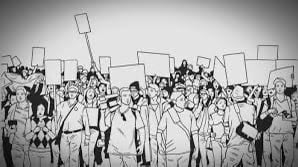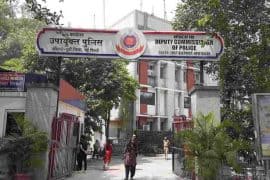Navigating political identity in college, especially for members of marginalised groups, often involves balancing personal truth with the fear of scrutiny. The struggle between silence and speaking out highlights systemic issues and personal challenges in advocating for one’s identity.
Once you enter the ever-thriving, “politically inclusive” college campuses, you realise that nothing can ever be totally excluded from politics. Your identity, your existence is itself political. Or so some of us believe it to be. Usually it’s said that most people who would rather not talk about certain issues because, “it’s too political” or “don’t want to get too political” are the ones that choose to not talk about politics as it threatens the system they are comfortably benefited by. This idea, predominantly, is veracious; however, it at times disregards the threat of being political among people from marginalised groups owing to their fragile political identity. The fear of suppression and surveillance is a legitimate fear that has shaped the political discourse of the country – such that silence is the only resistance some people can take up. Silence in the face of revolting questions creates an agency, a boundary to limit what parts of you other people have access to. However, in the face of oppression, how long can silence be used as a form of resistance?
I, as a student, have aims. But the fear of scrutiny given my regional and religious identity has many times limited the outpour of my words. “Be quiet, no matter what.” was the only advice I received when I entered college. But for how long? How long does one stay quiet in the hope that their voices will be heard, even in silence? Speaking your truth without the fear of being scrutinised and without your words being termed dissent is a feat yet to be achieved.
This fear is not irrational but is rather born out of the reality of where one comes from. It’s like walking a tightrope —being true to one’s identity while also protecting it. In one of the seminars I attended last winter, organised for the students of Jammu and Kashmir studying in Delhi, it was amusing and of course, appalling. The speaker for the session, a Kashmiri IAS officer who I’d rather not name, took it on himself to showcase the internalised stereotypes associated with Kashmiris. One of the students, studying in North Campus, wanted advice on what to do when being called a terrorist by their peer groups. The “advice” given is still fresh in my mind. “You need to do better. You being called a terrorist might have some reality to it. Act appropriately, engage well with the peer groups, and you’ll finally be accepted.” Words, when spoken with such assertiveness, can ingrain themselves into young minds, often distorting the true reality.
The complexity of issues – with layers of historical, cultural, and political dimensions, is often reduced to simplistic narratives that fail to capture the lived experiences of the people. When people around you, with the privilege of speaking up without fear, are selective in their outrage – voicing their opinions on issues elsewhere in the world yet remaining silent when it comes to the ongoings in the backyard of their homes, it creates a sense of isolation and obscurity for those who have suffered and somehow, managed to survive. What adds to the loneliness is the fear of not being able to speak your truth. However, this fear, more than anything, “radicalises” you as a person. Well, if wanting emancipation and an end to the vicious cycle of oppression makes one radical, I would rather be radical than a liberal.
The Indian liberal discourse, the foundation on which the nation was built, becomes farcical when issues like Kashmir come up. In the 19th century, Indian liberals demanded a representative government. Instead of marginalising certain groups or promoting majoritarianism, they sought out political systems that would reflect India’s diversity and provide a platform for freedom of expression. But the repetitive denial of this freedom to a major chunk of the population only reflects the defect in our national values.
Ironically, I would have never reflected on any of these ideas if I didn’t have the privilege to see the world beyond what my imagination could grasp. The college experience – with all its positives and negatives, opened me to ideas that I wouldn’t dare trade for my life. It has been an enabler for being outspoken and upfront about opinions I hold dear. It has enhanced the understanding of my identity and the importance of my existence as a form of representation for the countless others who share the same fear and navigate through these spaces with the same caution. However, the fear stays, creeping in the corner of your mind and resurfacing every time you choose to speak up. The constant anxiety of using appropriate words resurfaces, like when I started writing this article, and limits the authority you have over your own opinions.
Read also: Editorial: Republic and Dissent: The R&D of Our Nation
Featured Image Credits: 1. TheCompanion
Caption: Students and the freedom of expression
- Business Standard
Caption: The dissent in expression
Reeba Khan





Comments are closed.